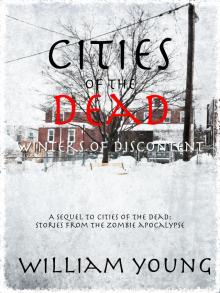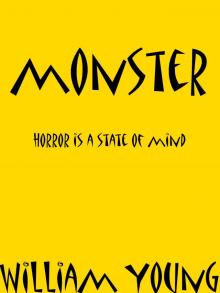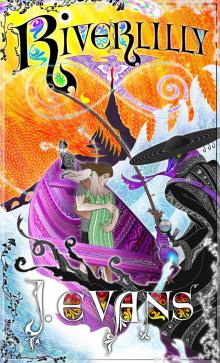- Home
- William Young
Monster Page 18
Monster Read online
Page 18
Nick awoke to the alarm, shut it off, and called in sick. At the point where his spine connected with his head two railroad spikes had been driven through his skull and were intermittently charged with electricity. He guzzled two glasses of water, a matching number of aspirin and trudged back into the bedroom and slipped beneath the sheets. He was nine-tenths of the way to sleep when Sarah tapped him on the shoulder three times.
"Huh?" he asked groggily.
"You're supposed to stay up after turning off the alarm, not go back to sleep."
He kept his eyes closed and rolled his head over toward her. "I called off today. I need to sleep more."
"A half-bottle of Scotch will do that to you," Sarah said, rolling out of bed and leaving the room.
He re-awoke three hours later, the bed sheets tangled around his legs and two of the four pillows pushed onto the floor. He pulled on his clothes from the night before and shuffled down the street to the corner coffee shop. The patio was empty and he was glad for the solitude. It went well with his triple-shot cappuccino, dwindling hangover and swelling self-pity. Soon, the patio would close and the people he stared at from his kitchen window would huddle behind steamed-up windows. He looked up at the window, drew in a sigh and expelled it.
"Nick?" a burred voice questioned from his right. "Nick, well good-morning."
Nick twisted his neck and looked up into the stained beard of Mordechai. He was wearing the same black jacket and pants, only today he had a worn, faded blue silk scarf wrapped around his neck and tucked beneath the lapels. Nick smiled weakly up at Mordechai he put a thick hand on the back of one of the chairs and pulled it away from the table.
"You don't mind if I join you, do you?" he asked, pausing now that the chair was fully dislodged from beneath the table.
Nick shook his head no and motioned for him sit.
"Aren't you supposed to be at work?" Mordechai asked as his hands searched through an interior network of blazer and shirt pockets, produced a thin, rectangular box of cheroots and filched one from within. He did another series of first-base coach signals before producing a pack of matches.
"Not today; I took off."
"Ahh," Mordechai said, nodded once and put flame to the end of his thin cigar. "So, have you thought about what we talked about?"
"No," Nick said, sipping his coffee and wiping a thin moustache of froth from his lip.
"Yeah, I know what you must have thought afterwards. That I must be some sort of drunken psychiatric out-patient in need of booster shots," Mordechai said.
"Something like that."
"Yeah, it's weird to find out about. Nobody ever believes right away."
"I'm sure some of us never believe," Nick said.
Mordechai smiled. "Well, no. If you've got one, why wouldn't you believe? I mean, you can see it, sense it, feel it. No big mystery there. The people who don't believe are the ones without one, and they only don't believe because, hell, who'd tell somebody a story like that? Besides, you don't want them to find out. I mean, I don't want to be a government experiment, do you?"
Nick stared past Mordechai's shoulder at the traffic pausing at the red light. A woman in a blue sedan was applying lipstick and looking in the rear view mirror.
"No, I guess not," Nick said flatly without looking back at Mordechai.
"Do you have time?"
"For what?"
"To come with me up the street to the bookstore. I want to show you something."
Nick rubbed his eyes and looked into Mordechai's stained beard. He shouldn't go, he knew that. He wasn't up for the agitation, but something inside him urged him to go.
"Sure," Nick said.
Nick sat at a table inside the Barnes & Noble bookstore on Murray Ave. sipping coffee he had purchased from the coffee bar while Mordechai pawed over a bookrack near the science and history shelves. Nick couldn't see what Mordechai was specifically looking for, but imagined a selection of books on the paranormal, Bigfoot and the Loch Ness monster. He drummed his fingers on the wooden table top and stared at the customers flipping through magazines nearby. Mordechai strolled over to the table and set down a stack of books, an eclectic collection of anthropology, history and what looked to be fiction. Nick straightened up in his chair.
"Like I think I started saying the other day, these symbionts take time to develop in the body. It takes them decades to mature and reach consciousness, a moment I call the `Awakening,'" Mordechai said. "It depends on the person, of course, but from what I've been able to determine the average symbiont becomes awake sometime around a person's 30th birthday, give or take a half-dozen years."
"Uh-huh," Nick said.
"Now look in here," Mordechai said, pushing a book across the table and opening it. "In this book is a collection of what this author considers to be the world's most influential persons. If you read through this, you'll find that most of the people suddenly became so-called geniuses near their 30th birthday, give or take a few years."
Nick frowned and looked down as Mordechai flipped to a page and tapped it. "Look. Jesus, of course, revolutionized religious thought but was essentially a nobody until he turned 30," Mordechai tapped the page's illustration of Jesus. "Look through it and you'll see the similarities."
Nick turned a few pages, skimming the names from the section heads and finding most of the people to have been religious leaders, statesmen, philosophers or inventors. He stopped on one and scanned the passage quickly. "This one on Leonardo Da Vinci doesn't say anything about his age when he suddenly turned brilliant, it just lists what he did and what it led to."
"That's not the point, you have to research their biographies to figure out which ones have similar age patterns for their success," Mordechai said.
"What about child geniuses like Mozart?"
"What about them? I never said everyone with a symbiont became a legendary figure. Nor did I say that every legendary figure had a symbiont. Not everybody that's good with math is a scientist, some are mere card counters," Mordechai said curtly. "You have to look at a preponderance of evidence, though, and then you have to look within to understand what the symbiont is doing to you."
Nick nodded and turned his palm upward to indicate Mordechai should continue.
"Listen, if what you said to your friend in the bar is true, then you definitely are in the early stages of the `Awakening' and you have to understand what you're up against. You don't want voices in your head you don't understand and psychologists can't squelch; you have to learn how to deal with it," Mordechai said.
"How's this going to help?" Nick said, nodding toward the books.
"By telling you what can happen, you can try to control it. You have to get in touch with what the symbiont has to offer and channel that into your own life," Mordechai said. "If you look into these lives, you can find out what undid them, what aspect of their humanity couldn't keep up with the silent demands of the symbiont. They have helped people immensely, but often that help has tormented the human part of them."
"What about an example from modern times?" Nick asked.
"Like Earnest Hemingway, perhaps? Blossoming young writer becomes genius re-inventor of American fiction just before he turns 30. He goes on to redefine prose and turn out, well, a variety of awesome and mediocre novels. But the voices were always there, he called them having a case of the Black Ass. Eventually, it drove him to ever increasing drinking and, ultimately, stays in mental institutions and suicide," Mordechai said.
"How do you know it was a symbiont? Did you ever meet him?" Nick asked.
Mordechai shrugged and shook his head. "No, I never met him. But I've studied him and I know it to be true."
Nick looked past Mordechai at a young woman in her late 20s flipping through a copy of a woman's magazine. She brushed back some strands of her chin-length auburn hair and looked up from the magazine and stared at Nick and smiled. Nick smiled back and looked at Mordechai.
"What did it do for you?" Nick asked.
"It turned me from just a ha
ck violinist into a symphony player," Mordechai said. "Until I was in my early twenties, I was just an average, run-of-the-mill violinist earning a living as a cobbler in my father's shoe shop. And then, one day, it happened: My fingers raced and my bowing sharpened to a precision no amount of practice had never brought me near."
"So that's why you're not famous in any way I'd know about," Nick said sarcastically. "Still playing?"
Mordechai shook his head. "No, I stopped ten years ago.
"Why?"
Mordechai shrugged. "Well, that was the extent of my career, I guess. My symbiont isn’t talented enough to make me great, just good, I suppose. Nobody really knows the full extent of how the relationship works. Sometimes, they don’t work out at all, slowly driving both minds toward insanity.”
“Like your Hemingway example of greatness?” Nick said with a smirk to his voice.
Mordechai stroked his beard. “Yes, perhaps.”
Nick was taking some entertainment from the expedition to the bookstore and the questioning of Mordechai, although he wasn’t sure if his questions should be mocking in tone or serious.
“How many people do these things drive nuts?”
“Who knows? There are some who think all of the insane are failed mergers, but no way to find out without ultimately exposing the symbiont presence.”
“That’s quite a convenient dilemma you’ve got there with your symbiont-thingies, isn’t it? You’ve got all sorts of theories but no way to prove anything or, rather, the only way to prove anything is the surest course you can’t take because it would expose the things to everyone. I got that right?” Nick said.
“Listen, Nick, I wouldn’t have even bothered to tell you any of this if I hadn’t overheard you telling your story about your strange lump,” Mordechai said, leaning in close. “What you’ve got happening to you is a typical failure to integrate. The symbiont’s location is off, which is why it’s showing where it is, rather than embedded deeper. If this continues … nothing good will come of it.”
“Well, Mordechai, my coffee is empty and I think I’m going to head on home for a shower and maybe a long afternoon with my PlayStation,” Nick said, standing and stepping away from the table.
“No, Nick, please. I have much more to tell you, and if you continue down this path it won’t go well for you,” Mordechai said. “Your human side will fight against the symbiont, and you’ll become an alcoholic or drug addict.”
Nick sighed slightly and looked past Mordechai at the woman. She was now sitting on an easy chair at the end of one of the magazine racks and looking at him out of the corner of her eye. She saw Nick catch her glance and smiled quickly before turning her attention to the magazine on her lap.
"I thought you said these things were beneficial to you. If they drive you insane or to addiction that doesn't sound too good," Nick said.
"Yes, they are beneficial to your physical body in that they keep a large number of debilitating illnesses, diseases and cancers from invading it. If you become an alcoholic, the symbiont keeps you from liver failure, somehow, but the alcohol wears down your mind until it's dull, as any drug would," Mordechai said, his voice full of weariness. "Which is the whole point: Two consciousness working in the same space can be difficult to manage. So, you see, they must merge. The symbiont must be awoken."
Nick motioned to the books. "I thought you said there wasn't anything written about symbionts."
"There isn't."
"Then what's with all these books? I mean, I'm not going to believe these bugs exist just because you say a lot of famous people must have had them because of some odd subset of similarities," Nick said. “I’ll bet if I go home, I can find hundreds of web pages with all sorts of wacky details about these so-called symbiont organisms.”
Mordechai shook his head and looked down at the table. "Do you remember when I asked you if humans were the only sentient species on the planet?"
"Yeah."
"And I told you that humans were, with the exception of this symbiont creature."
"Yeah."
"What if I told you there had been another sentient species on the planet?"
"Like what?"
"A being almost exactly like man, but not human."
"You said gorillas weren't sentient. And not dolphins or whales, either."
"Whales and dolphins are just sea mammals. I'm talking about another species that arose around the time of Homo Sapiens but was not us, not human," Mordechai said.
"What?"
Mordechai pulled an anthropology book from the stack and slid it across the table. Next to it he put a novel. "I'm talking about Neanderthal man."
"Huh? What are you talking about? Neanderthals are on the evolutionary chart, I've seen it. They're right there next to Cro-Magnon man or something like that," Nick said.
"Evolution is a scientific theory, Nick, not a scientific fact. There’s no absolute reason to think that one species mutated into the next. That's what the scientists used to think. Now they think something else. They think Neanderthal man was an entirely different branch, not human, like us, coming from a certain chain of beings, but a different, intelligent, sentient being that coincided with humans for a brief period of time long ago," Mordechai said.
Nick looked at the books before him and then at the auburn-haired woman flipping through different magazines. His head swam.
"Okay, so some scientist thinks that and writes a book about it. What does that prove about these symbiont things?" Nick asked.
"It proves they can exist, one; and two, why they won't let anyone know of their existence," Mordechai said.
"I don't know if it proves either."
Mordechai tapped the books. "You've got to understand this, and I know it sounds extraordinary, but you have to listen and believe: If symbionts are real -- and they are -- then they certainly learned how to stay alive, and that was definitely not something Neanderthal man learned in his dealings with humans," Mordechai said. "Current research indicates that the Neanderthals were wiped out by Homo Sapiens in an ongoing battle for dominance of the food. Rather than cooperating, humans killed off another sentient species so that we could take over. It only follows that we would do the same if symbionts were exposed.
"Think about it. The symbionts were here to witness the tenacity of our species for ensuring we are at the top of the pile. Neanderthal man created musical instruments and tools, only he wasn't equipped with the brainpower of his Homo Sapiens neighbors, and was wiped out by them," Mordechai said. "It only stands to reason they'd stay quiet."
"So, that's why everyone with one of these has kept quiet? Because they don't want to be examined by scientists and doctors trying to find symbionts?"
"Essentially, but it's more complicated than that. They'd have burned you at the stake as a witch or sorcerer in the past. Today, you'd die on an operating table or in a psych ward," Mordechai said.
"But what about affecting the way I think? Wouldn't I detect something else trying to change my mind about things?"
Mordechai smiled. "I suppose some people hear voices."
"So what good does it do for a symbiont to take over a body and then send the host to a psychiatric hospital?"
Mordechai shrugged. "It would do none, although I'm sure it happens all too frequently. But that's not what I meant when I said it influences your consciousness."
Nick looked around the book shop for a moment, using the rows of shelves and pile carpeting to bring him back into the real world. Mordechai continued.
"What it does is enhance some portion of your personality. If you were a good leader, it would make you better. If you were a great artist, it would make you a master. If you were a poor athlete, it would make you a good athlete. It all depends on the character of the symbiont," Mordechai explained. "Like humans, they are sentient, intelligent, and gravitate toward certain things as dictated by their personality."
Nick sat back down and stared at Mordechai. Something didn't make sense and Nick had f
igured it out.
"Okay, so how do they reproduce? If one of them is in me, male or female or whatever, how does it reproduce and get its offspring into another body?"
Mordechai shrugged. "To know that, you'd have to be able to study them. And since they don't want to be discovered, they don't allow that to happen."
"How convenient. And how did you come by all this un-findable information?"
Mordechai tapped his head. “I have on in me. It told me.”
"I don't know. I only know that you can tell when one is reaching the Awakening. But if you don't know it is being awoke, you can't do anything about it," Mordechai said and stood. "Read those and you'll understand a little more. I have to go, now, but I'm sure we'll talk again very soon."
Nick looked up at him. "Wait. Why are you even bothering to tell me this? What's the point?"
Mordechai placed his palms on the table and leaned in close to Nick. "You are about to go through the `Awakening.' You need to know you are not going insane and there's not going to be anybody out there who'd believe you if you told them what was really happening to you. There are no people out there to help you. Remember that."
"What about you?" Nick asked.
"What could I do?" Mordechai said. "It's not like giving birth. It's not physical, it's mental."
"One more thing," Nick said quickly. "Can it be stopped?"
Mordechai stood up and shook his head. "No, but alcohol, narcotics, pills, … all of that can be used to keep it subdued, to stunt its growth, but never fully, and probably not all the time. You have to sleep, you know, and your dreams are not always just dreams. Sometimes, they are messages from deep within you."
Mordechai turned and shuffled away from the table, looking down at the girl with auburn hair as he passed. She looked up at him and then over at Nick, smiled quickly and returned to her magazine. Nick pulled at the pile of books and one tumbled from the stack toward him. It was a book on dream interpretation.
NINETEEN

_preview.jpg) Waiting for the Great Leap Forward (Cities of the Dead)
Waiting for the Great Leap Forward (Cities of the Dead)_preview.jpg) Days Go By (Cities of the Dead)
Days Go By (Cities of the Dead)_preview.jpg) All Hell Breaks Loose (Cities of the Dead)
All Hell Breaks Loose (Cities of the Dead) The Signal
The Signal_preview.jpg) The Third Time is the Harm (Cities of the Dead)
The Third Time is the Harm (Cities of the Dead)_preview.jpg) The Lazarus Question (Cities of the Dead)
The Lazarus Question (Cities of the Dead)_preview.jpg) What are Little Zombies Made of? (Cities of the Dead)
What are Little Zombies Made of? (Cities of the Dead) Loverman
Loverman Cities of the Dead: Winters of Discontent
Cities of the Dead: Winters of Discontent_preview.jpg) Death Takes a Holiday (Cities of the Dead)
Death Takes a Holiday (Cities of the Dead) Monster
Monster_preview.jpg) The Undeath of Rob Zombie (Cities of the Dead)
The Undeath of Rob Zombie (Cities of the Dead) Riverlilly
Riverlilly_preview.jpg) Killing Country Music (Cities of the Dead)
Killing Country Music (Cities of the Dead)